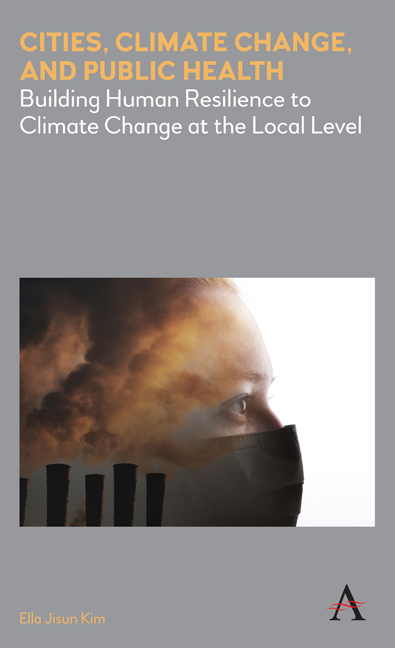 Cities, Climate Change, and Public Health
Cities, Climate Change, and Public Health Book contents
- Frontmatter
- Dedication
- Contents
- List of Figures and Tables
- Acknowledgments
- Chapter 1 Introduction
- Chapter 2 Cities, Climate Change, and Public Health
- Chapter 3 Collective Climate Adaptation at the Local Level
- Chapter 4 Framing Climate Change as a Public Health Issue
- Chapter 5 Role-Play Simulations
- Chapter 6 Digital Games
- Chapter 7 Role-Play Simulations versus Digital Games
- Chapter 8 Discussion and Policy Recommendations
- Appendix A Issue Framing Vignettes
- Appendix B Issue Framing Survey Questions
- Appendix C Role-Play Simulation Before-Survey Questions
- Appendix D Role-Play Simulation After-Survey Questions
- Appendix E Role-Play Simulation Facilitator Questionnaire
- Appendix F Role-Play Simulation Debriefing Script
- Appendix G Role-Play Simulation Post-Game Interview Questions
- Appendix H Role-Play Simulation Workshop Sample Characteristics
- Appendix I Digital Game Before-Survey Questions
- Appendix J Digital Game After-Survey Questions
- Appendix K Digital Game Post-Game Interview Questions
- Appendix L Digital Game Sample Characteristics
- References
- Index
Chapter 4 - Framing Climate Change as a Public Health Issue
Published online by Cambridge University Press: 06 May 2020
- Frontmatter
- Dedication
- Contents
- List of Figures and Tables
- Acknowledgments
- Chapter 1 Introduction
- Chapter 2 Cities, Climate Change, and Public Health
- Chapter 3 Collective Climate Adaptation at the Local Level
- Chapter 4 Framing Climate Change as a Public Health Issue
- Chapter 5 Role-Play Simulations
- Chapter 6 Digital Games
- Chapter 7 Role-Play Simulations versus Digital Games
- Chapter 8 Discussion and Policy Recommendations
- Appendix A Issue Framing Vignettes
- Appendix B Issue Framing Survey Questions
- Appendix C Role-Play Simulation Before-Survey Questions
- Appendix D Role-Play Simulation After-Survey Questions
- Appendix E Role-Play Simulation Facilitator Questionnaire
- Appendix F Role-Play Simulation Debriefing Script
- Appendix G Role-Play Simulation Post-Game Interview Questions
- Appendix H Role-Play Simulation Workshop Sample Characteristics
- Appendix I Digital Game Before-Survey Questions
- Appendix J Digital Game After-Survey Questions
- Appendix K Digital Game Post-Game Interview Questions
- Appendix L Digital Game Sample Characteristics
- References
- Index
Summary
Issue Framing and Public Opinion
The framing of a policy issue has been called the “essence of public opinion formation” (Chong 1993, 870). Indeed, framing is one of the primary means policymakers can use to influence public opinion; the way an issue is framed matters for how publics think about it (Sniderman and Theriault 2004). As Entman summarizes the phenomenon, “To frame is to select some aspects of a perceived reality and make them more salient in a communicating text, in such a way as to promote a particular problem definition, causal interpretation, moral evaluation, and/ or treatment recommendation for the item described” (Entman 1993, 52). In other words, a framing effect occurs when in describing an issue or event, “emphasizing a subset of potentially relevant considerations causes individuals to focus on these considerations when constructing their opinions” (Druckman 2001b, 230).
For example, framing the discussion about a Ku Klux Klan rally as a public safety or free speech issue shapes public opinion in widely diverging ways (Druckman 2001b). Similarly, even with the same details, public acceptance of a potential policy to control a rapidly spreading disease is higher when the policy solution is framed as saving a number of lives compared to when the policy is framed as losing others (Tversky and Kahneman 1981). Framing effects are understood as a result of heuristic information processing (Kuhberger 1997; McElroy and Seta 2003), with frames serving as cognitive shortcuts to help people make sense of complex information (Kaufman et al. 2003).
There are two types of framing effects. The first, the equivalency framing effect, results in people modifying their preferences when “different, but logically equivalent” words or phrases are used to describe the same phenomenon (Druckman 2001b, 228). For instance, people view the same glass of water differently depending on whether the glass is described as half-full or half-empty. In the previously mentioned seminal study of the equivalency framing effect, the Asian disease task paper, Tversky and Kahneman (1981) elicited different policy preferences from people by framing the same problem as either an issue of saving lives or minimizing expected deaths, showing that the framing of questions as losses or gains systemically reverses people's choices.
- Type
- Chapter
- Information
- Cities, Climate Change, and Public HealthBuilding Human Resilience to Climate Change at the Local Level, pp. 21 - 30Publisher: Anthem PressPrint publication year: 2020


